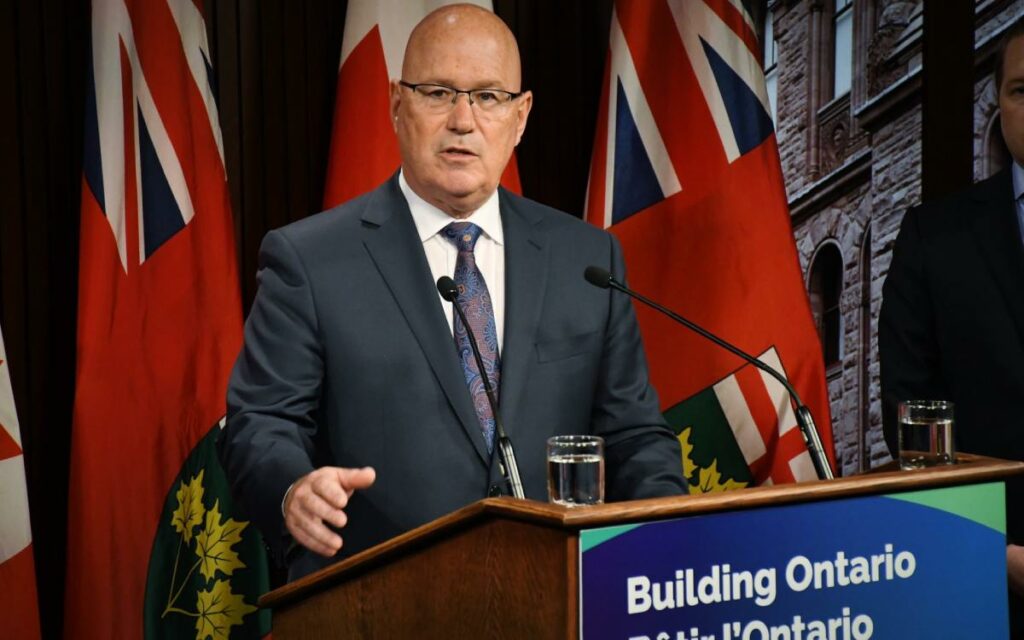
And it still could help. It is a painful step for any minister, but for the political health and credibility of a government, it is a very important one. It shows that accountability matters. Pictured is Minister of Municipal Affairs and Housing Steve Clark. Photo credit: Twitter/Steve Clark
If Ontario Premier Doug Ford loses the next election, the roots of that defeat will be found in the current controversy over the government’s decision to build much-needed housing on “Greenbelt” land previously protected from development.
New public opinion polls show that the Auditor General’s (AG) report on the matter, coupled with persistent Opposition attacks and the resulting media spotlight are undermining the Premier’s popular support.
Before voters rush to judgement, there are a few facts that should be kept in mind.
First, everyone agrees Ontario has a serious shortage of affordable housing. The situation has only gotten worse with unplanned for and unexpected jumps in population growth due to increased immigration and an influx of international students.
Last year, more than 500,000 people settled in Ontario. That is more new immigrants than the entire country absorbed the previous year.
Secondly, the amount of land involved in the controversy, represents about one third of one per cent of the land that is still protected in the Greenbelt, about 7,000 acres.
The Ford government then added 9,000 more acres to the Greenbelt. In other words, it is protecting more land now than was being protected before.
Thirdly, this was not “public” or “government owned land” that was somehow given away to developers for free. All the land was already privately owned by developers and other individuals who had made purchases, sometimes, many years ago.
Under the agreement to develop the land, developers themselves will pay for much of the infrastructure needed to support the new housing, e.g., sewers, roads, and parks, etc.
The AG’s report found no evidence that individuals were inappropriately tipped off in advance of the announcement that certain protected lands would be removed from the Greenbelt designation.
Contrary to reports, the government is not under a criminal investigation. The OPP, who have been pressured by the Opposition to launch one, passed the buck to the RCMP, fearing their own work might not be seen as independent given that the province is their boss. The RCMP has not launched a criminal investigation and at this point, are only reviewing information to determine if such investigation is warranted.
It should also be noted that the Premier himself has asked the Integrity Commissioner to investigate to ensure that no one in government personally benefitted or broke conflict-of-interest rules.
He also agreed with the Auditor General that the process followed by the government to decide which land would be removed from protection was seriously flawed. He has pledged to follow all the AG’s process recommendations, except the one asking that the decision to remove the land be reversed.
That being said, it is a political mess, one that is largely of the government’s own making and one that is overshadowing everything else the government is trying to do.
It is easy to apply 20-20 hindsight. But Ford and his team knew what a powder keg the Greenbelt issue was when he first said he would develop some of the protected land earlier in his mandate. The resulting brouhaha caused him to quickly reverse course and back off.
This government has a welcome bias to action, to get things done. But a clear lesson to heed is that you always need a credible, transparent process to reach a decision. That doesn’t have to mean more red tape or bureaucratic hurdles.
By the Premier’s own words, the process was wrong. This is no longer a first term government facing a controversy. It is their second mandate and not the first time they have faced a crisis.
And finally, as this column has noted before, crisis management matters. As does the concept of ministerial responsibility.
This author was a member of Premier Mike Harris’ government where a minister was expected to resign in the face of a serious screw up. There were two incidents where confidentiality rules appeared to have been seriously breached. In each case, the minister on the file stepped aside, pending an investigation.
This author herself had to offer her resignation from cabinet once when a situation threatened to erupt into a political controversy. Thankfully it did not.
It is a painful step for any minister, but for the political health and credibility of a government, it is a very important one. It shows that accountability matters.
It also does not help the Tories’ credibility now to know that in Opposition, they themselves frequently called on ministers in the Liberal government to resign when trouble hit.
As Toronto Star columnist Martin Regg Cohn noted, Housing Minister Steve Clark himself was not shy about doing so on several occasions when in Opposition. But now that he is under fire, he has refused to do so, and the Premier has refused to ask him to.
If Clark or Ford had done so, it would not have made the issue go away, but it would have given much needed credibility to the Premier’s claim of accountability for a process gone wrong.

Janet Ecker is a former Ontario Finance Minister, Minister of Education, Minister of Community and Social Services and Government House Leader in the governments of Premier Mike Harris and Premier Ernie Eves. After her political career, she served as the founding CEO of the Toronto Financial Services Alliance, a public-private partnership dedicated to building Toronto region into an international financial centre. She currently sits on a number of corporate and non-profit boards, agencies and advisory committees.
Ms. Ecker received the Order of Canada for her public service contributions and was recognized as one of the “Most Influential People in the World’s Financial Centres” by Financial Centres International. She also received a “Canada’s Most Powerful Women: Top 100 Award” from the Women’s Executive Network and the Richard Ivey School of Business, among other awards. She is also one of the founders of Equal Voice, a national, multi-partisan organization working to elect more women.


















